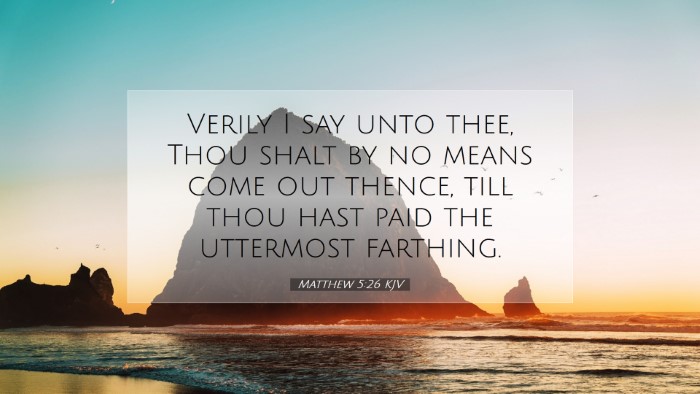Commentary on Matthew 5:26
Bible Verse: "Verily I say unto thee, Thou shalt by no means come out thence, till thou hast paid the uttermost farthing."
Introduction
This verse concludes a teaching of Jesus concerning the serious nature of anger and the importance of reconciliation. He warns of the repercussions of failing to resolve disputes and emphasizes the concept of divine justice and the certitude of accountability.
Commentary Insights
1. The Contextual Setting
Matthew 5:26 is part of the Sermon on the Mount, where Jesus presents the radical demands of discipleship and the kingdom of God. In preceding verses, Jesus discusses the spiritual implications of anger and disputes between individuals.
2. The Meaning of "Verily I Say Unto Thee"
This phrase indicates the authority with which Jesus speaks. It serves as a solemn affirmation of truth, wherein He underscores the seriousness of the message that follows. Matthew Henry emphasizes that Jesus conveys certainty about the consequences of unresolved conflict.
3. The Concept of Debt and Justice
In this verse, the metaphor of debt is significant. It illustrates the idea that unresolved issues between individuals must be addressed. Albert Barnes points out that the term "uttermost farthing" refers to the smallest coin of that time, signifying that no matter how small the debt might seem, it must be reconciled. Failure to do so leads to spiritual imprisonment.
3.1 The "Uttermost Farthing"
This phrase, as Adam Clarke notes, represents total accountability. A “farthing,” or quadrans, was the least valued Roman coin, stressing the demand for complete payment. The implication is that God’s justice requires all debts—spiritual and moral—to be settled; nothing can be overlooked.
4. The Seriousness of Anger
Prior to this verse, Jesus teaches that harboring anger is akin to murder. This elucidates the gravity of relational strife. Matthew Henry elaborates that unresolved anger can imprison one’s spirit, just as failing to clear a debt can lead to imprisonment in ancient legal systems.
5. Implications for Believers
The teachings surrounding Matthew 5:26 call for believers to actively pursue reconciliation and settle disputes quickly. As outlined by Albert Barnes, the verse serves as a disciplined believer's guide that emphasizes accountability and the necessity of right relationships with others.
5.1 Practical Applications for Church Leaders
- Encourage Confrontation: Pastors should guide their congregations towards healthy confrontation of conflicts.
- Teach Financial Integrity: Understanding debt in practical terms can cultivate teachings on financial integrity and stewardship.
- Promote Reconciliation: The church has a duty to embody forgiveness and restoration in community relationships.
6. Eschatological Perspective
Some theological interpretations extend the notion of accountability to the eschatological realm. As noted by Clarke, there is a sense in which all debts will be settled either in this life or the next. The eventual judgment will hold individuals accountable for their actions, underlining the necessity of reconciliation.
7. Conclusion
Matthew 5:26 encapsulates profound truths about human relationships and divine justice. It challenges believers to continually evaluate the state of their hearts regarding anger and debt, pushing them towards a lifestyle of reconciliation and peace. As Henry, Barnes, and Clarke collectively convey, this verse beckons a response to God's call for honesty and integrity in our dealings with others.


